#bonded forever
Explore tagged Tumblr posts
Text
i dont think a lot of people realize why separating the good and evil of someone isnt possible, so im going to try and explain it ^_^
to sum it up rq: what the good and evil actually are is the moral code and animal instincts of a person. having both is what makes us human. if one was taken away or separated, we'd lose our humanity.
firstly, there is no good and evil. the good and evil jekyll is referring to is his repressed desires and impulses. but, as i described in one of my previous posts, there's a reason for these desires and impulses. to sum it up, that reason is the animal instinctual need for whatever benefit you may get by doing it. there is no consequences or guilt when it comes to instincts. the reason these must be controlled is because some of these, especially jekyll's, instincts, impulses, and desires goes against society's morals.
i think a lot of people have already know that, but because the separation between them is distinct, why is it physically impossible? because having both is what separates us between animals and robots. animals only have animal instincts, experiencing very little guilt or fear of consequences, especially if they aren't domestic. their lack of awareness is what puts them lower in the food chain, what makes them 'stupider'. robots, on the other hand, have nothing besides the principles and ethics that they're programmed with. they have no instincts or desires to do anything outside of what they've been told is right. this is also why we fear them gaining any sort of soul or natural instincts, because of the power that comes with it. people have both, we have been gifted with both instincts and morals, nature and nurture. if either were taken away, we would no longer be human, wed lose our humanity.
#i hope this makes sense#please give me feedback!!#i also dont think wed be able to form culture or religion without both#they are fighting but while holding hands#bonded forever#the strange case of dr jekyll and mr hyde#dr jekyll and mr hyde#jekyll and hyde#redeath talks
41 notes
·
View notes
Text
























stan putting his hand/arm over his family's shoulders compilation!!!
+ ford returning the favour
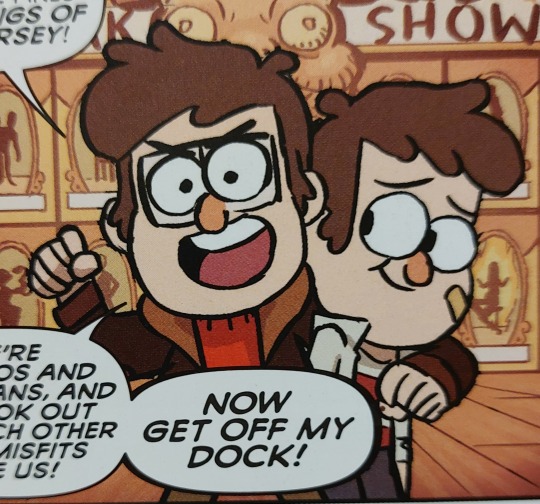



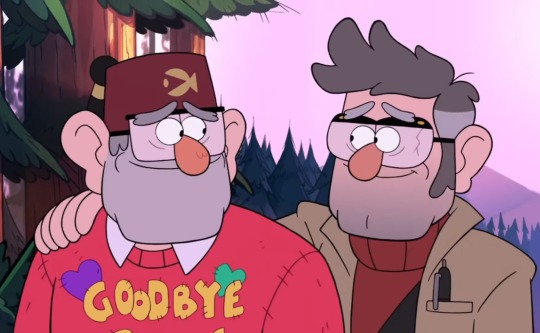

#seeing him being so physically affectionate but also knowing he was alone for decades...#gravity falls#stan pines#stanley pines#ford pines#stanford pines#dipper pines#mabel pines#soos ramirez#also its especially funny seeing stan's early s1 design next to his s2 one#the new tbob pic having him look so happy arghhhhhhhhhhhhhhhhh#anyway we really needed that stan+wendy crime bonding ep#forever canon in my heart#yes the words 'he loves his family!!!!' is constantly on loop in my brain
1K notes
·
View notes
Text
Dpxdc prompt #4!!:
AU WHERE:
Dick grayson sees Danny in an alley late at night when he’s patrolling and fully believes it’s Jason.
Dick as nightwing: “Little wing..?”
Danny looks up from the trashcan he was riffling in looking for spare parts behind a bestbuy: “..wha-“
Dick, tackling Danny in a giant hug: “I- I thought you were- oh Jason!”
Danny just accepts this bc as the ghost king he sometimes has the tendency to look like other ghosts..: “Oh- uh.. there, there..?”
Dick eventually figures out that Danny isn’t Jason when he tries to take him to the manor, and Danny has to awkwardly fess up that he’s not actually Nightwings dead younger brother, but he might be able to find jason’s soul, being the king of the infinite realms and all.
Danny and Dick go on a crazy adventure looking for Jason.
#danny phantom#dpxdc#batman#dick and danny#they’d have a brotherly bond obvi#i feel like their adventure would be very similar to dipper and mable traversing weirdmigeden#also jason’s already been revived at this point but they don’t know that..#danny and dick brotherly pair i didn’t know i needed#if someone writes this i will forever be in your debt 💸#danny is obvi bad at consoling people#danny fenton#dick grayson#jason todd#dpxdc idea#dpxdc crossover#dp x dc prompt
1K notes
·
View notes
Text
as an indian person, my favourite thing is seeing what people who aren't from here have done with my food; i'll go to an indian restaurant in a random corner of the world and they're putting oregano in their palak paneer or a balsamic wash on their naan and it's like "yes good tell me how you folded your culture into mine and came out with something new and lovely, we're holding hands across oceans bestie"
#brought to you by a very nice conversation I had with someone today#food#culture#meow speaks#my danish friend is making my grandmother's poshto recipe and my american friend learnt how to make sambhar the way my great grandma makes#and swapped ingredients for what they had and were bonded now forever ♥️🥲#and I put crushed peanuts on top of all pasta dishes cause it reminds me of my friend from Bangkok who did the same
3K notes
·
View notes
Text
they’re literally the best couple ever


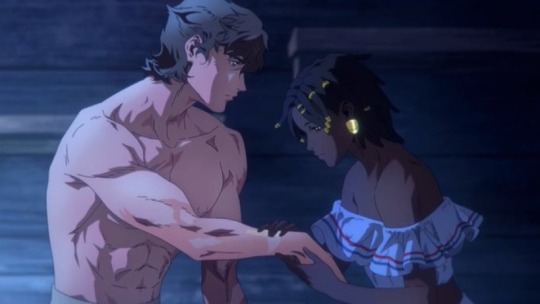
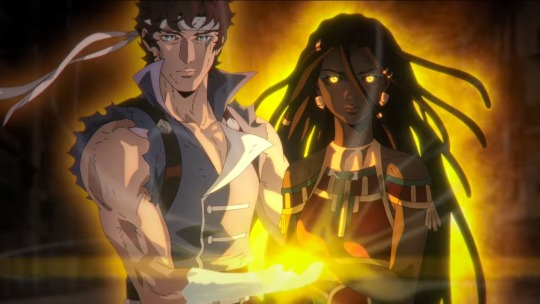

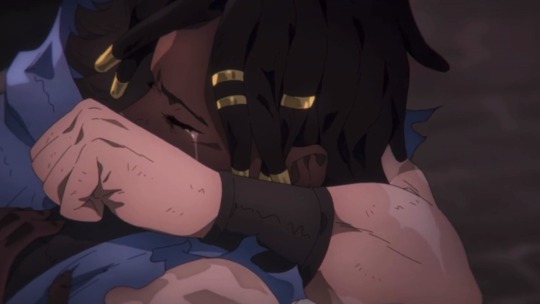
#I love them i love them i love them i love them i love them i#they’re so CUTEEEE I LOVE THEMMMM#YALL KNOW I BEEN WAITING FOR THIS SINCE 2023 CMON NOWWWW#richette you will forever be famous . thrive my beautiful ones#they were just what the other needed >.< found comfort and motivation within each other and it was so pure & wholesome 🤍#just adorable . it was paced so perfectly and their bond was so precious#really needed one another >.< i love how devoted richter is to herrrr ugh he’s the perfect boyfriend#best girl annette i always believed in you ❤︎#꒰ঌ castlevania.ᐟ ໒꒱#꒰ঌ rambles.ᐟ ໒꒱#castlevania nocturne#ৎ୭ ⨾ richter.ᐟ#ৎ୭ ⨾ annette.ᐟ#ৎ୭ ⨾ richette.ᐟ#꒰ঌ castlevania: nocturne.ᐟ ໒꒱#castlevania netflix#castlevania nocturne s2#castlevania nocturne season 2#richette#annette castlevania#richter belmont
881 notes
·
View notes
Text


i really need everyone but especially anyone who romanced gale with a bard tav to know about this interaction from early access that larian took from us
#baldur's gate 3#gale dekarios#gale x tav#bg3#gale of waterdeep#oc: elenion silverdew#starweave#i'm putting this in my tags for gale and my tav because i need to remember it forever okay#literally as soon as i first met gale and he said he liked poetry i was like 'omg i wish a bard could say something about that'#and then months later i find out how to roll back the game to EA. and i play it.#and i find out BARDS *COULD* SAY SOMETHING ABOUT THAT#AND THEY TOOK IT AWAY FROM ME?!?!?#will never forgive larian for this actually#because this dialogue is literally so cute and i don't see any good reason for removing it#i still headcanon that gale and elenion bond over poetry and that this basically happens anyway though 💜
1K notes
·
View notes
Text


broken bones n' fresh blood.


#submas#it scares me how delicate beautiful things are. fresh feathers. peeled pomegranates. memories and bonds.#everything seems so fragile nowadays. and learning how to take care of those precious things is exhausting.#and even then mistakes still happen. i wish the world was kinder to some people. i wish good things lasted forever.#anywayss#warden ingo#submas emmet#ingo#emmet#my art
457 notes
·
View notes
Text
Eternal Bonds: Tim and Danny’s Infinite Realms Marriage
In the Infinite Realms, marriage is an unparalleled commitment. Unlike the mortal world, where love can be fleeting and easily undone, marriage in the Realms is something far more sacred. It’s not just about vows or ceremonies—it’s about merging souls, creating a bond that not even the vast stretches of time can sever. The very idea of marriage in the Realms is rare, almost mythical, because it requires two beings to love each other so profoundly that they’re willing to bind their very existence to one another.
For the ghosts and entities that reside in this realm, eternity isn’t just a poetic idea—it’s a reality. Time is meaningless when you’re no longer alive, when your very essence is bound to the afterlife. And because of this, relationships are viewed through a different lens. There’s no such thing as divorce, no “time apart.” Once a couple is bound, their souls are intertwined forever. To dedicate your entire being—past, present, and future—to another means accepting that their joys, sorrows, triumphs, and failures will be yours too. It’s a partnership where breaking the bond is simply impossible.
It’s why marriage is such a rare occurrence in the Realms. The ghosts, who have already lived one life and often seen the frailty of mortal promises, don’t enter into this kind of bond lightly. It’s only for the strongest of loves, for the most steadfast of commitments. Because once you marry in the Infinite Realms, that bond holds through eternity itself.
And yet, despite the gravity of it all, Tim and Danny find themselves willing to make that very commitment. Tim, a mortal tied to a world where things end, where nothing lasts forever, steps into the unknown. His love for Danny is so deep, so unshakable, that he agrees to a traditional Infinite Realms marriage. He knows full well the weight of it—he’s not just vowing to love Danny in this life, but in every life after. In swearing to this bond, Tim is offering his entire being to Danny, for now and all of eternity.
For Danny, this choice means even more. As a halfa, he exists between two worlds, knowing both the mortality of the living and the permanence of the ghostly afterlife. His love for Tim is powerful enough that he’s willing to make this eternal commitment, knowing that there’s no one else in any world—mortal, ghostly, or beyond—he would rather be tied to. For Danny, the bond is as natural as breathing. It’s a connection that deepens their relationship in a way that transcends the limitations of their two worlds.
Their marriage isn’t just a declaration of love—it’s a merging of souls, a binding that makes them two parts of the same whole. It overwhelms them with the sense of safety and belonging that they’ve both craved in their lives. In each other, they find the kind of love that doesn’t just endure life’s difficulties but thrives beyond them. Their bond ties them together forever in a way that no one else could understand, but to Tim and Danny, it’s everything.
They are each other’s home. And in the Infinite Realms, there is no greater honor, no stronger connection, than to be bound by love for all of eternity.
#brain dead#dead tired#tim drake#danny phantom#danny fenton#dc x dp#i totally think that marriage should be a sacred thing in the afterlife because you are promising to love someone for all eternity#eternity in a very literal sense btw#tim and danny should also just be undeniable soulmates in like every world ever#you can also totally make this angsty depending on how you think tim will end up in the realms#i had a few ideas#an interesting route could be that the traditional Infinite Realms marriage alters Tim fundamentally#turning him into a halfa like Danny#this transformation would ensure that they are not only emotionally and spiritually bonded#but also physically tied to the same plane of existence#another being tim might age much slower almost as if he’s been granted an extended lifespan#so that they can share a near-eternity together#he would still be alive but his mortality would be stretched out far beyond a normal human lifespan#i think this one is more devastating tho:#danny has to watch tim grow old while he remains ageless or only ages very slowly#but because the wedding binds their souls in the afterlife tim would not truly leave danny forever upon death#instead the moment tim's mortal life ends his soul could be drawn into the infinite realms to live with danny for eternity#agh theres just so much potential for this idea!! so many things i can add and have thought abt that would be so interesting to see!#i'm so in love with this concept
711 notes
·
View notes
Note
Can i know your HEADCANONS about spyper? :0


OF. COURSE. and bonus RED spyper stuff too!
i don’t have very deliberate headcanons for a lot of freaks, but spyper is an exception because he used to be one of my very favorites :) he still honestly kind of is
i didn’t know how to include it, but another headcanon about spyper i have is that he has traits and habits that are “leftover” from the spy and sniper he used to be. his right pointer finger is twitchy and fidgety (a trait from sniper), and he chews on wheat as a substitute for cigarettes (sniper wasn’t a smoker, but spy evidently was and spyper gets nagging feelings of needing a smoke still).
the RED medic that sewed spyper together honestly did a shoddy job, since spyper still feels and thinks his body is rejecting his head. he often feels disembodied/disconnected in his own body. yknow… being two separate people grafted together and forming a third, new subconscious and everything. wicked stuff
and i don’t have a lot on RED spyper for now, but i do know that i think he’s a LOT more ‘stable’ of a hybrid than (BLU) spyper is. i wonder what his deal is
#freak fortress#tf2 freaks#tf2#team fortress 2#spyper#red spyper#era.txt#era.png#anon#id in alt text#ohhh spyper you’ll forever be famous to me#…anyway#we ALL can agree spyper and intelligent heavy have SOMETHING going on right#like. we ALL can see it#i know the wiki/s say that bs like ‘ohh they have a brotherly bond’ BUT I THINK WE ALL KNOW THE TRUTH HERE?#it’s honestly giving ‘and historians will say they were the bestest of friends’#anyway all of this to say that i propose spyper and intelligent heavys shipname to be Pots n Vans#thanks chat. gooood night
436 notes
·
View notes
Photo
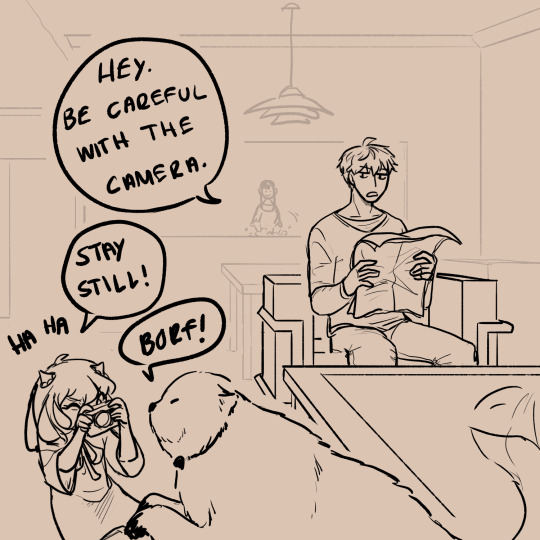








i think loid should laugh for real and catch everyone off guard when he does 😤 and i do think bond looking goofy would set him off bc (yall know)
this was a commission for a very cool, patient person (you know who you are)! seriously I took forever on this but it’s finally DONE! thank you for commissioning me, i really enjoyed making this comic and im happy with how it turned out 🥺🙏
also, bonus bond pic:

#also havent done a comic in forever so this felt really nice!!#spy x family#my art#sxf#sxf art#spy x family art#spy x family comic#sxf comic#my comic#loid forger#sxf loid#yor forger#sxf yor#anya forger#sxf anya#bond forger#sxf bond#yor#anya#loid#twilight#sxf twilight#agent twilight#thorn princess#sxf thorn princess#twiyor#loidyor#loiyor
10K notes
·
View notes
Text

Toph as a Goalball player 💪💚
#atla#avatar the last airbender#atla fanart#atla art#toph beifong art#toph beifong fanart#atla toph#toph beifong#toph#goalball#paralympics#paralympics 2024#atla modern au#tales from the couch#tales from the couch au#the gaang#She'd be RUTHLESS#An absolute menace#I think she'd pick up the sport as another way to show the middle finger to her parents#“Oh I'm too weak because I'm blind? Too delicate? Too easy to break? I can't do the same things any normal person can?#“Well bad news mom and dad. It's because I'm blind that I got the national team a gold medal for the first time in forever. Suck it up.”#She took up wrestling and martial arts as well. As a treat.#On the bright side for her mom Toph does pottery too!#She bonds with Zuko over art and their absolute disdain for all things high society#The Gaang go to every single game of hers to cheer for her. The bring signs even tho it's “literally a sport for blind people Twinkletoes”#In short: she's a badass in every single universe and I love her#Hashtag goals#Also yes I drew shows in the bottom pic#There's rules and my girl may be an absolute bamf but she knows when to play by them#She still trains shoeless because of course she does
797 notes
·
View notes
Text

i've been completely charmed by witch hat atelier♡
(art prints)
#witch hat atelier#guys... i had been meaning to read this for so long and i'm so mad that it took me forever to start#but omg i'm SO glad to be finally here now😭😭😭💖💖💖#this story is so special😭😭🥺🥺 i love everything about it so much#found family+queer+fantasy are my top 3 story themes ever it's like this manga was made for me... plus the old fairytale art style omg#every page is stunning... genuinely some of the most beautiful art i've seen in my life#consistently spectacular composition & gorgeous character design throughout the entire thing it's so amazing#shirahama kamome is incredible the work she's doing here is seriously amazing on every level#the story is so good and deep and heartfelt and the bond between the 6 main characters is my favorite thing ever😭 that's a family!!!!!!#it's a masterpiece i'm so serious please go buy it and read it. if you like the same things as me you're going to love it#i'm so excited to see where the story goes next and to watch the anime next year🥹🥹#witch hat atelier fanart#qifrey#coco#qifrey witch hat atelier#coco witch hat atelier#wha#wha fanart#illo#illustration#artists on tumblr#green#blue#atelier of witch hat
602 notes
·
View notes
Text
Dick’s role in A Lonely Place of Dying is so massively important and good, which is why it’s so sad when it gets overlooked or erased.
In the 1990 collected edition, Dennis O’Neil (Batman editor of the time) talked about why he wanted Dick to be a central part of the third Robin’s origin. Dick needed to be there to show several key points:
Tim and Dick are deeply connected to each other (their childhood meeting at the circus, which links old Robin to new)
Dick approves of and endorses Tim as Robin (he directly tells Bruce that Tim should be Robin)
Dick cannot return to being Robin, no matter how much he tries, because he has his own new role now (this is shown through the failed Batman/Nightwing teamup against Two Face)
O’Neil’s goal was to preemptively combat any potential concerns or complaints readers might have about a third Robin. He had overseen the updates to Jason’s origins and had observed the mistakes they made and which complaints they received. In particular, the new origin for Jason 2.0 gave Dick little control over leaving the Robin mantle or passing it down. This bolstered fan complaints that Jason was usurping Dick, a feeling that O’Neil did not want to continue with the third Robin.
These considerations were the foundation of how Marv Wolfman constructed Tim’s origin and character: someone with an almost fated connection to Dick, who idealized Dick and was passionate about what the dynamic duo meant as symbols, and who explicitly had Dick’s blessing to be Robin.
So, when people remove Dick from Tim’s origin, they are removing a core part of Tim’s character and how he got the mantle.
#* I think the way O’Neil talks about Jason is agonizing and slightly infuriating…but he was so right to make Dick central to Tim’s characte#I might need to scan my 1990 copy’s intro because I haven’t seen it online anywhere but it’s so interesting#tim drake#dick grayson#batfam#bonds: I knew it was you#batman: a lonely place of dying#heroesriseandfall#lpod#I’m biased of course as a forever Dick & Tim brother-soulmates truther#dennis o'neil
419 notes
·
View notes
Text
itafushi is like ... we aren't dating but our souls are intertwined. only you could understand my pain. you hold me when i wake up with night terrors. i come home to you every night. we kiss but its not about the act of kissing its about feeling safe enough to experience intimacy and warmth from another person. you promise me you won't leave and i believe you, i've never not believed you
#does this make sense#also not against the idea of dating obviously#but they are bonded together forever fr#itafushi#megumi x yuuji#yuuji x megumi#yuji itadori#megumi fushiguro#jjk#jujutsu kaisen
687 notes
·
View notes
Text
this is literally one of my favorite panels of the war arc.

i am OBSESSED with deku’s perception of romance and how it’s probably based off popular melodramas and his peers’ stories about their dates.
because you can’t argue with me that that’s the reason why he will have no idea his and katsuki’s relationship is so close to romantic. i’m so sure he’s gonna be the last one to realise his feelings for katsuki aren’t purely friendly and platonic. the guy will be like “oh yeah we’re really close and i care about him deeply and i hate the very thought of him being hurt and i wanna spend the rest of my life next to kacchan but haha that’s just our friendship! we’re not holding hands and sharing crepes so there are no romantic feelings involved🥰”
bro is gonna be so shocked when kacchan finally confesses his true feelings.
#also yes i believe katsuki’s gonna realise everything first. i mean im pretty sure he already has. damn.#good luck dealing with deku’s obliviousness lmaooo#i think izuku doesnt think about romance at all but his feelings for katsuki sound EXACTLY like any person’s in love#‘wow hes so amazing i wanna be close to him forever and never part’ bro#i dont think he can describe their relationship as friendship tbh… ig for izuku it means much more than any possible common type of bond#bakudeku#bkdk#izuku midoriya#bakugou katsuki#bakugo katsuki#bnha#mha#boku no hero academia#my hero academia
969 notes
·
View notes
Text


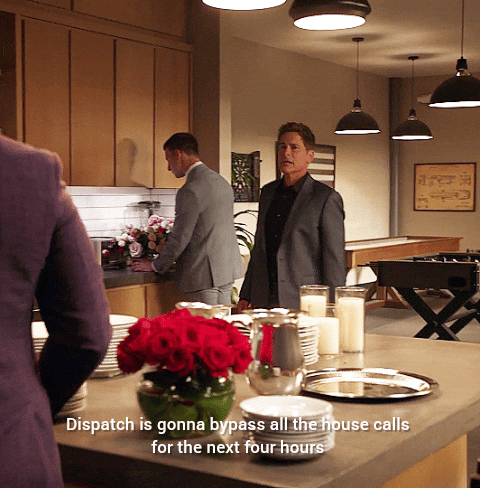
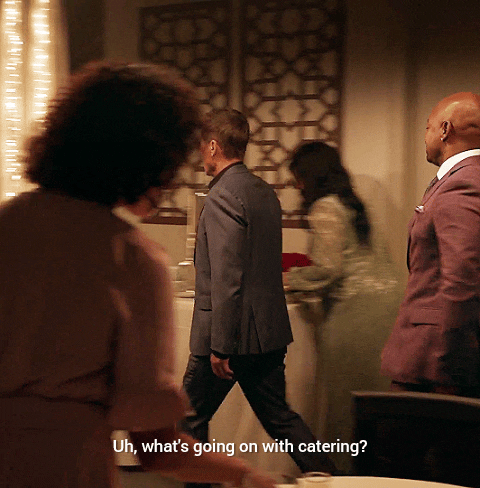


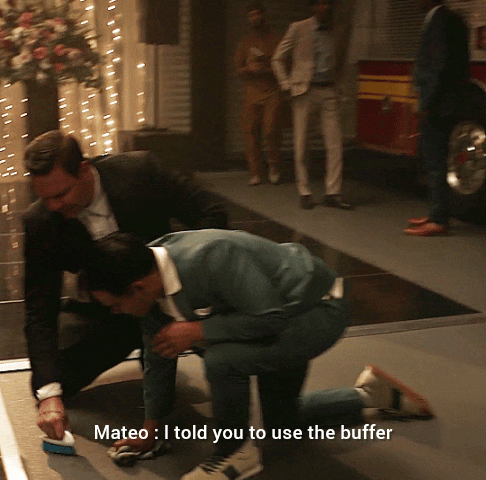
MARJAN'S PEOPLE Preparing for Her Wedding At The Firehouse. 9-1-1 : LONE STAR : S05E10 "All Who Wander"
#FAMILYYYY 😖😖😖#feeling a little extra mushy over owen taking care of everything for Marjan's wedding#scheduling with dispatch and checking on every aspect#to go as perfect as possible. They've come a long way since the pilot. Marjan bringing back the 126 together. Marjan dragging him home in#the middle of a whiteout. owen being by her side during the lawsuit and when she decided to go on the road. he threw a massive party for her#return. then ended up saving her life. he was there for her when she was trying to find her love match. now she's getting married in the#firehouse they both fought for throughout the years 😭#gonna cry forever over their found family bond#911 lone star#911ls#911lsedit#911lonestaredit#carlos reyes#tk strand#owen strand#marjan marwani#natacha karam#paul strickland#mateo chavez#judd ryder#126#5x10#lonestardaily#tarlos#Marjan's wedding#my edit
221 notes
·
View notes